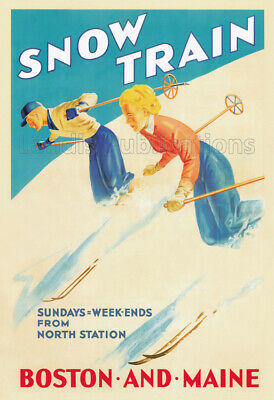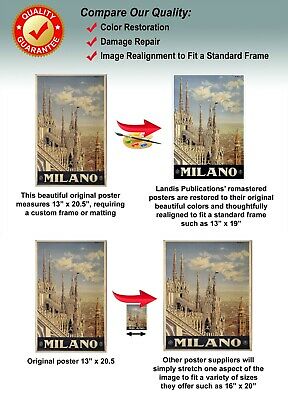-40%
Boston and Maine Railroad - Snow Trains- 1930's Travel Poster
$ 10.53
- Description
- Size Guide
Description
These are simply the best posters available! You will be thrilled with the image quality, vivid colors, fine paper, and unique subjects.
OUR POSTERS ARE SIZED FOR STANDARD OFF-THE-SHELF FRAMES, WITH NO CUSTOM FRAMING REQUIRED, PROVIDING HUGE COST SAVINGS!
This beautiful reproduction poster has been re-mastered from an original advertising poster for the Boston and Maine Railroad’s “Snow Train” excursions to ski resorts in the northeast.
The vibrant colors and detail of this classic image have been painstakingly brought back to life to preserve a great piece of history.
The high-resolution image is printed on heavy archival photo paper, on a large-format, professional giclée process printer. The poster is shipped in a rigid cardboard tube, and is ready for framing.
The 13"x19" format is an excellent image size that looks great as a stand-alone piece of art, or as a grouped visual statement. These posters require
no cutting, trimming, or custom framing
, and a wide variety of 13"x19" frames are readily available at your local craft or hobby retailer, and online.
A great vintage print for your home, shop, or business!
HISTORY OF THE BOSTON & MAINE RAILROAD
The Boston and Maine Railroad began with the idea of constructing a continuous inland route between Boston and Portland, the Boston and Maine Railroad gradually gained control of other lines until the B&M system linked hundreds of cities, towns, and villages in Massachusetts, Maine, New Hampshire, Vermont, and New York.
Shipments of grain, ice, lumber, meat and produce over its rails contributed to the expansion of Boston as a market center and a great seaport. The B&M and its predecessor companies made possible the development of New England’s manufacturing cities and eliminated the crushing isolation of life in the country. For most communities it became the link to the outside world. It also found markets for the products of each town’s industry and in return brought to every locality the whole range and variety of goods that were the fruit of the Industrial Revolution.
The Boston & Maine Railroad was the successor to the Andover and Wilmington Railroad which opened in 1836. Over the next 65 years the B&M gained control (through lease, purchase, or stock ownership) of the Eastern, Boston and Lowell, Connecticut and Passumpsic Rivers, Concord & Montreal, Connecticut River, Fitchburg, Portland and Rochester, and Worcester and Nashua railroads, most of which themselves were agglomerations of shorter, earlier roads. All had their main lines and branches that wove a tight web of steel through northern Massachusetts, southern Maine, the state of New Hampshire, and eastern New York and Vermont. At its peak B&M maintained over 2,300 route miles of track, 1,200 steam locomotives, and a force of 28,000 employees. The road’s principal shops were located at North Billerica, Mass. and Concord, N.H. Major freight yards were built at Boston, East Deerfield, Rigby, and Mechanicville.
Developing Tourism
The B&M led the charge for the development of tourism in New England. The delights of Lake Winnipesaukee and the White Mountains, the promotion of seacoast resorts, and the romantic attractions of New England’s historic places were captured in B&M view-books, magazines, and extensive newspaper advertising. In the 1930s and 1940s the Boston and Maine Snow Trains were a major boost to the development of the winter sports business.












